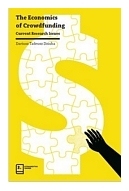|

THE ECONOMICS OF CROWDFUNDING CURRENT RESEARCH ISSUES
DZIUBA D.T. wydawnictwo: WYDAWNICTWA DRUGIE , rok wydania 2016, wydanie Icena netto: 40.49 Twoja cena 38,47 zł + 5% vat - dodaj do koszyka The Economics of Crowdfunding
Current Research Issues
One of the first books on the European market to comprehensively
identify and address issues surrounding crowdfunding. Extensive empirical evidence,
knowledge, and research ensures its accessibility to a broad spectrum of readers. For
those interested in practicalities, this book shows how best to use information technology
and resources available to micro-entities, whereas academics will benefit from
methodologies, as well as ideas and directions for further research into new forms of
economic activity in an environment of globalisation and modern IT.
This book is, therefore, of great benefit for economics students, tutors and lecturers, as
well as postgraduate students of economics, management, and particularly MBA students in
finance and computer science for economics. Also of interest for managers of institutions,
businesses and foundations reliant on public funding (charitable, cultural, educational)
for whom crowdfunding is, or may become, an important form of fundraising. Professor
Dziuba’s book should be mandatory for e-commerce and crowdfunding IT platform system
designers and administrators.
From the review by prof. dr. hab. Józef Oleński
Preface
Chapter I
The economics of crowdfunding - objectives and areas of research
Chapter 2
Introduction to the economics of crowdfunding
The concept of crowdfunding
Players involved in the crowdfunding process
The economics of crowdfunding: the need for research
Chapter 3 Crowdfunding effects
Crowdfunding: macro- and microeconomic implications
Pros and cons of crowdfunding
Mesoeconomic effects of crowdfunding.
Platform specialisation
Integration of crowdfunding services
with the fmancial sector. Crowdbanking
Chapter 4 Crowdfunding models
A typology of crowdfunding models Donation-based models Lending-based models
lnvestment-based models Hybrid models Rewarding strategies (models)
Chapter 5
Crowdfunding market segment
Method of separation
Findings
Structure of the crowdfunding market
Market structure by crowdfunding models
Conclusions
Chapter 6
Geographical pattern of the value stream
Chapter 7
Crowdfunding campaigns and the risk of insufficient financing
Wspieram.to: research objectives
Fundingvalue ranges
The risk of insufficient support for projects
The set of unfinanced campaigns
Conclusions
Chapter 8
Crowdfunding success factors. Case studies
Case study: KissKissBankBank
Case study: FundedByMe
Effectiveness of campaigns launched at KickStarter
Determinants of an effective crowdfunding campaign
Chapter 9
Measuring the variability of success rates
Research objectives and hypotheses Measurement of success rates Measurement of
acceptance rates Conclusions
Afterword References
Appendix 1 -
Crowdfunding - a historical perspective
Appendix 2 Country codes
Appendix 3
Crowdfunding web-based platforms: selected statistics
Appendix 4
Polish crowdfunding web-based platforms
188 pages, Paperback
Księgarnia nie działa. Nie odpowiadamy na pytania i nie realizujemy zamówien. Do odwolania !.
|


